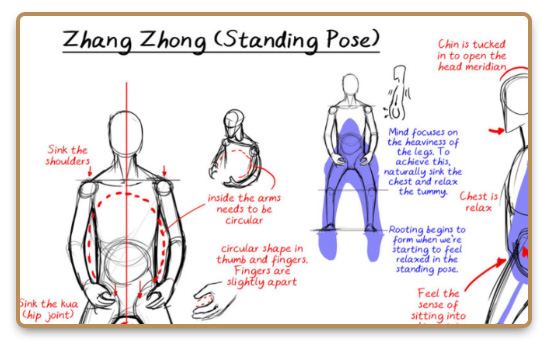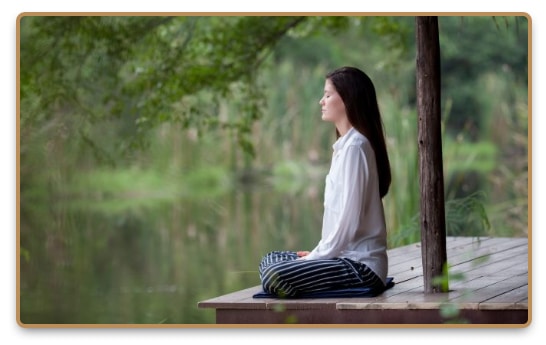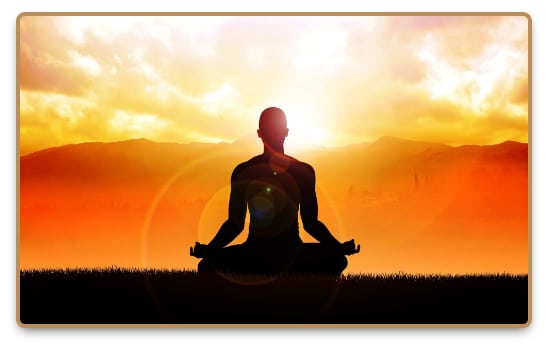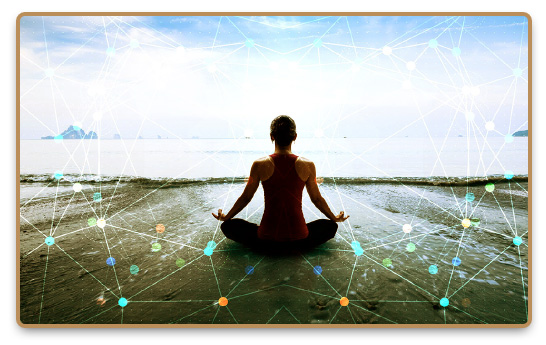
26 Jan Mindfulness Meditation: Focus on the Moment
What Is Mindfulness Meditation?
Mindfulness meditation is a style of meditation where one tries to bring their attention to the present experience. It is more than just a meditation form, but a way of living. Mindfulness meditation can be practiced throughout the day while doing nearly any task. It comes built in with the assumption that your mind is going to wander.
The goal is to accept your thoughts as temporary and passing, that you need to merely “witness your thoughts”. The key to mindfulness meditation is not to be discouraged by the hyperactivity of the mind, but recognize it and improve, much like lifting a heavy weight.
Where Does Mindfulness Meditation Come From?
Mindfulness meditation has connections far back to ancient times, its roots connected to both zen and Buddhism. Mindfulness is even a part of the eight-fold path to enlightenment. The modern Western practice of mindfulness is said to be based upon the transcendentalist movements as popularized by nineteenth century philosophers such as Henry David Thoreau, Walt Whitman, and Ralph Waldo Emerson.
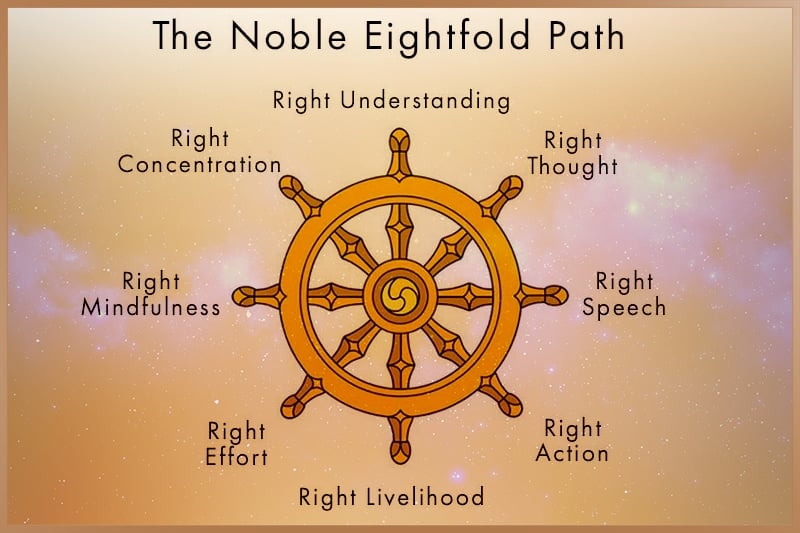
In the twentieth century, professor Jon Kabat-Zinn of the University of Massachusetts started to study mindfulness in a medical context. He formed the Mindfulness-Based Stress Reduction (MBSR) program, which inspired a series of therapy methods to help people apply Buddhist ideology to healing.
One reason it has gained such popularity is that it is primarily secular, despite its inspirations. It’s important to recognize, however, that mindfulness meditation is one path to reaching a state of mindfulness.

As long as you are breathing, there is more right with you than there is wrong, no matter how ill or how hopeless you may feel. But if you hope to mobilize your inner capacities for growth and for healing and to take charge in your life on a new level, a certain kind of effort and energy on your part will be required.... It will take conscious effort on your part to move in a direction of healing and inner peace. This means learning to work with the very stress and pain that is causing you to suffer.
What It Looks Like to Practice Mindfulness Meditation
Mindfulness Is about Awareness of Our Experience
Mindfulness is not always confined to the typical quiet meditation settings, but it often is. It can be practised when doing nearly anything. The practice is about awareness of our experience. Instead of automatizing our actions, we focus on them. This can be done while doing everyday tasks such as cleaning or showering. Instead of just washing, notice how the water feels running across the skin or how the feet connect to the ground. The idea is that one can “meditate” throughout the day, without setting aside time for it. Mindfulness meditation can be practiced nearly anytime and anywhere.
How to Practice Mindfulness Meditation
That said, it is strongly encouraged that one does dedicate time for a more traditional meditation practice as it can strengthen the general ability to live with mindfulness. It is recommended that one find a comfortable place to sit that is free of distractions. Sit up straight with an erect posture, but don’t force it. You should concentrate on how your legs feel. Rest your arms to your side and place your hands in your lap. Let your eyelids relax, but you don’t have to close your eyes completely. Start deepening your breath, but most importantly, concentrate on the sensation of breathing. You’ll notice that your attention may wander or you’ll experience a flow of thoughts.
See How to Deepen Mindfulness Meditation Practice with a simple device.
The idea of mindfulness meditation is not to fight this or be hard on yourself, but just let it move through you and return to the breath. Your goal is not to empty the mind or stop thoughts altogether. If you need to adjust your position, that’s fine. Just focus on the experience of sitting and breathing. Some suggest concentrating on the sensation of air flowing through your body and changes in your breathing patterns.
It is normal for this to be difficult at first. The important part is not to judge yourself, and just let your focus go back to the breath and the current moment. Don’t let yourself become frustrated. Like anything, it takes practice. There is no set amount of time one is required to meditate. It is recommended to begin with brief periods, as little as five minutes, and increase from there. It has been said that practicing mindfulness meditation only four times a week can be beneficial. Some have suggested that two sessions of twenty minutes everyday can give maximum benefit.
Although many practice alone, some can find benefit from meditating in groups led by an instructor. Another popular way to get started is to download “meditation apps”, such as Calm, Sam Harris’s Waking Up App or Headspace which offer guided meditations and other features to help people get into a regular mindfulness meditation habit.
People who are more visually or artistically inclined and want to practice mindfulness but are not attracted to traditional sitting meditation may find mindfulness art (such as mandala coloring books, free drawing) particularly appealing. A 2023 pilot study suggests that, especially for individuals who are experienced in meditation, mindful art may be a beneficial supplement to conventional mindfulness techniques.

What Are the Benefits and Risks of Mindfulness Meditation?
Mindfulness meditation and meditation in general has been shown to have a variety of positive benefits. Keep in mind that the quality of meditation research does vary. Some studies have shown that meditation can reduce one’s blood pressure and heart rate. In general, many agree that meditation does help reduce stress and put people in a state of relaxation. Reducing stress has been shown to have potential positive effects on immune function.
The Ultimate Goal of Mindfulness Meditation
The ultimate goal of mindfulness meditation is to bring mindfulness to one’s daily life. Mindfulness has been shown to be beneficial in a variety of ways. One of the most notable is its effect on anxiety. One study found that a mindfulness practice saw a significant decrease in self-reported symptoms of those suffering from generalized anxiety disorder. Because one of the main purposes of mindfulness is letting thoughts pass by, it has been shown to be helpful for some who suffer from depression.
Start practicing today
The Egely Wheel is trusted by thousands of people who practice yoga, telekinesis, meditation and healing. This device is the best solution for measuring your energy flow and efficiency of healing, and you get instant feedback.
Some studies have shown that practicing mindfulness may reduce rumination upon negative thoughts. There’s also been some suggestion that it can help people reduce unhealthy eating behaviors such as binge-eating and stress-eating.
The Benefits of Mindfulness Meditation on Interpersonal Relationships
Mindfulness has been shown to be beneficial to interpersonal relationships. In one study, it was found that romantic couples who exhibited a high level of mindfulness had higher satisfaction with their relationship and exhibited more resilience to stress related to the relationship. They also coped better with conflict.
Another study showed that mindful couples show a higher level of sexual satisfaction in their relationships. Other studies have looked at mindfulness in a workplace setting, and found a reduction in conflict avoidance and better management of conflict.
The Power of Mindfulness in Professional Life
Numerous people have attested to the power of mindfulness meditation in their lives. For example, numerous athletes have stated that it helps improve their performance and concentration. Others have claimed that it has a positive effect on creativity. One study has shown that a mindfulness practice may actually increase the density of the brain’s grey matter, which may have a positive effect on a number of areas including memory.
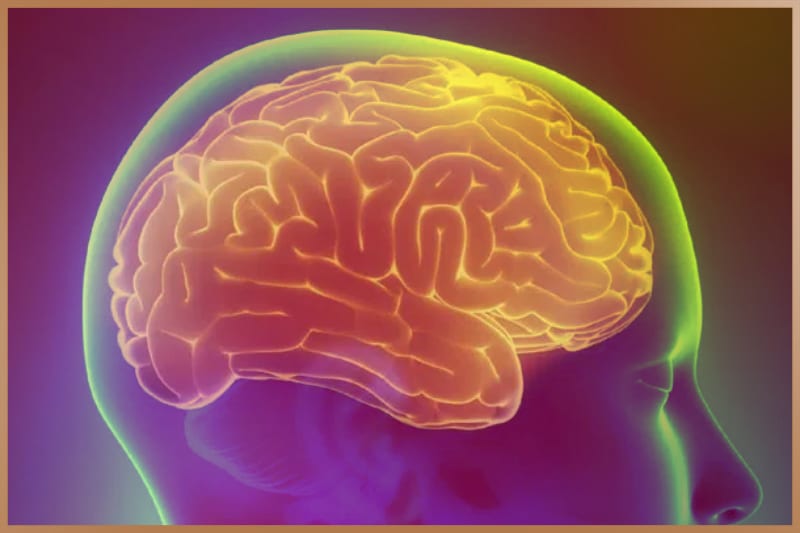
Criticism of Mindfulness Meditation
Not everyone agrees that these practices are some magical fix-all for stress and anxiety problems. For one, much of the research has been criticized, and there is a suggestion that much of the positive findings are actually inconclusive. It is important to recognize that it isn’t a practice for everyone, and in some cases, mindfulness can increase anxiety. By focusing so much one oneself, it could lead people to become too self-critical.
The truth is that a lot of people are not comfortable spending time witnessing their thoughts.
21 Sources +
Egely Wheel has strict sourcing guidelines and relies on peer-reviewed studies, academic research institutions, and medical associations. We avoid using tertiary references.
- Mindfulness – https://en.wikipedia.org/
- With mindfulness, life’s in the moment – https://news.harvard.edu/
- The role of mindfulness in romantic relationship satisfaction and responses to relationship stress – https://onlinelibrary.wiley.com/
- Mindfulness‐based interventions for obesity‐related eating behaviours: a literature review – https://onlinelibrary.wiley.com/
- Mindfulness‐based cognitive therapy for residual depressive symptoms – https://onlinelibrary.wiley.com/
- Find Your Calm – https://www.calm.com/
- Health Benefits of Meditation: What the Newest Research Shows – https://www.liebertpub.com/
- Getting Started with Mindfulness – https://www.mindful.org/
- Mindfulness: How to Do It – https://www.mindful.org/
- Randomized Controlled Trial of Mindfulness Meditation for Generalized Anxiety Disorder: Effects on Anxiety and Stress Reactivity – https://www.psychiatrist.com/
- How Stress Affects the Immune System – https://www.psychologytoday.com/
- Mindfulness and Rumination: Does Mindfulness Training Lead to Reductions in the Ruminative Thinking Associated With Depression? – https://www.researchgate.net/
- The effect of mindfulness training on reducing couple burnout of addict’s wife – https://www.researchgate.net/
- Mindfulness Practice Leads to Increases in Regional Brain Gray Matter Density – https://www.researchgate.net/
- Meditation Practices for Health: State of the Research – https://www.researchgate.net/
- Cultivating a conflict-positive workplace: How mindfulness facilitates constructive conflict management – https://www.sciencedirect.com/
- Can mindfulness be too much of a good thing? The value of a middle way – https://www.sciencedirect.com/
- The Sexual Mindfulness Project: An Initial Presentation of the Sexual and Relational Associations of Sexual Mindfulness – https://www.tandfonline.com/
- What Is Mindfulness Meditation? – https://www.verywellmind.com/
- Waking Up – https://www.wakingup.com/
- Effect of Mindfulness and Mindful Art on Beginners and Experienced Meditators – https://arxiv.org/
Updated: July 30, 2024. – This article was originally published on January 26, 2021.
Discover more types of Meditation
-
Zhuanqi Meditation: The Taoist Way of Vital Breathing
Zhuanqi meditation is a Taoist breathing technique used to create a union between the mind and qi. The process is built upon a focus on the breath. Learn more...
-
Zazen Meditation: How to Achieve a Zen Mind
Zazen meditation is a type of Zen Buddhist meditation technique developed in Japan with the purpose of stilling the mind and removing desire. Learn more...
-
Vipassana Meditation: The Buddhist Way to Gain Insight
Vipassana meditation is a method used by Buddhists to help detach from the cycle of desire and accept the true nature of reality. Learn more...

